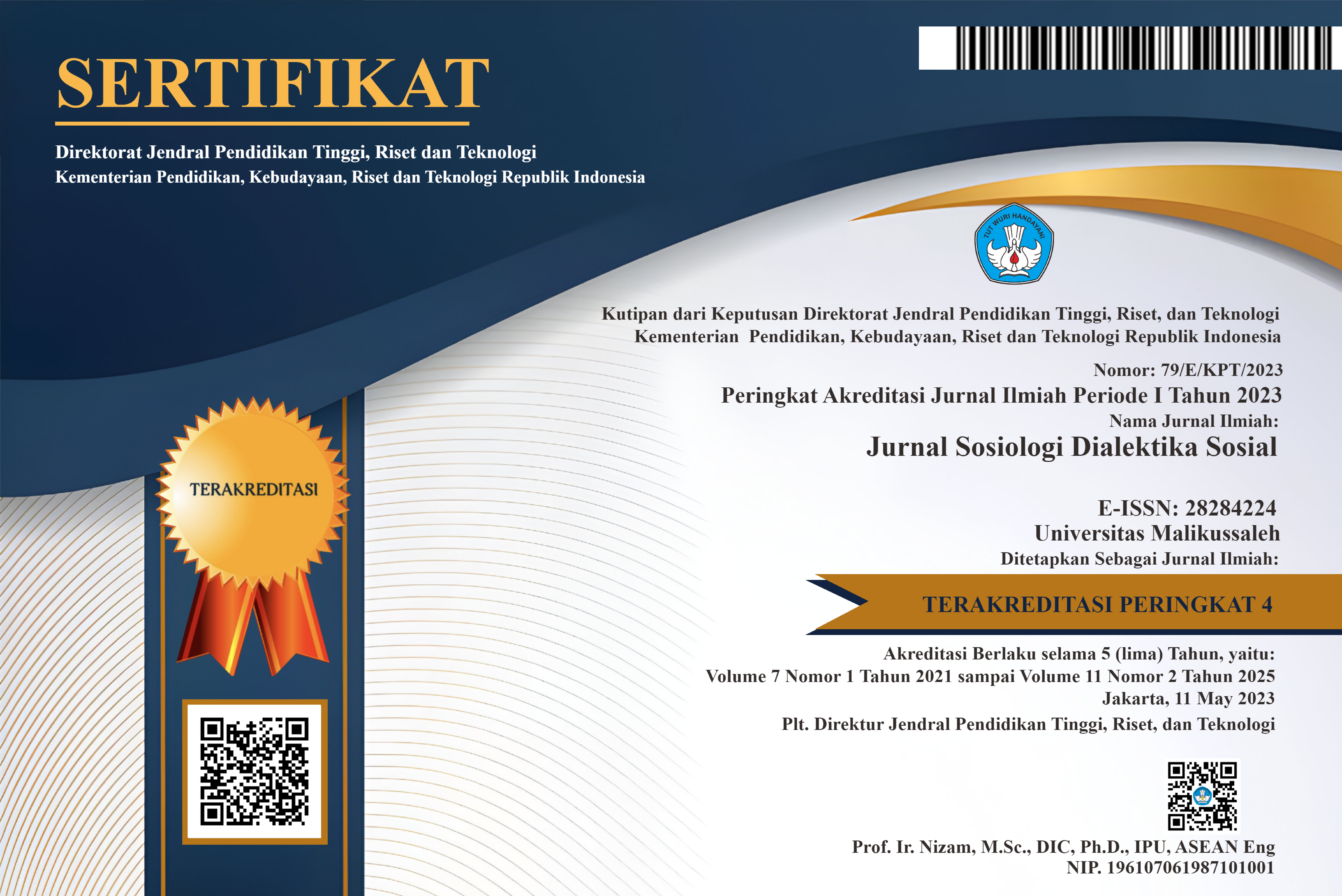JEJARING SOSIAL PERLINDUNGAN BURUH MIGRAN DI HONGKONG
Abstract
In the research, the relationship between the social networks of migrant domestic workers from Indonesia in Hong Kong and the accessibility of medical care and legal protection is investigated. To help others and support the struggle of BMI organizations and groups in Hong Kong, the Coalition of Indonesian Labor Organizations in Hong Kong (KOTKIHO) was founded out of concern and solidarity.. Similarly, participant observations from formal and informal activities were used in this research, which also drew on field notes. In order to control risk and gain access to resources for their health and well-being, KOTKIHO strategically use their strong and weak ties, deciding within their social network who and what to discuss with reference to medical issues. For characterizing and assessing the continuous dynamic social integration process, researchers suggest using social network analysis. Their employers, who can also provide them with access to institutional and social resources, are carefully negotiated with regarding their rights and opportunities. Participate in online discussions and debates regarding the health policies of their native and host nations. To better comprehend the complexity and intricacy of social integration, social network analysis must be done using a mixed-methods approach due to its limitations as a relatively new tool in the field of social integration research. It also demonstrates the establishment, activation, and mobilization of migrant social networks around discourses on state-designed immigration-related health policy.
Penelitian bertujuan untuk mengetahui hubungan antara jaringan sosial pekerja migran asal Indonesia di Hong Kong dengan aksesibilitas perlindungan hukum. Kelompok pekerja migran membantu sesama, mendukung perjuangan organisasi dan kelompok BMI di Hong Kong, sehingga didirikanlah Koalisi Organisasi Buruh Indonesia di Hong Kong (KOTKIHO) atas dasar kepedulian dan solidaritas. Demikian pula observasi partisipan dari kegiatan formal dan informal digunakan dalam kegiatan ini. penelitian, yang juga mengacu pada hasil studi lapangan. Untuk mengendalikan risiko dan mendapatkan akses ke sumber daya kesehatan dan kesejahteraan mereka, KOTKIHO secara strategis menggunakan ikatan kuat dan lemah mereka, memutuskan dalam jejaring sosial mereka siapa dan apa yang harus didiskusikan dengan mengacu pada masalah medis. Untuk mengkarakterisasi dan menilai proses integrasi sosial dinamis yang berkelanjutan, peneliti menyarankan untuk menggunakan analisis jaringan sosial. Majikan mereka, yang juga dapat memberi mereka akses ke sumber daya kelembagaan dan sosial, dinegosiasikan secara hati-hati mengenai hak dan peluang mereka. Berpartisipasi dalam diskusi dan debat online mengenai kebijakan kesehatan negara asal dan tuan rumah mereka. Untuk lebih memahami kompleksitas dan kerumitan integrasi sosial, analisis jaringan sosial harus dilakukan dengan menggunakan pendekatan metode campuran karena keterbatasannya sebagai alat yang relatif baru di bidang penelitian integrasi sosial. Ini juga menunjukkan pembentukan, aktivasi, dan mobilisasi jaringan sosial migran seputar wacana kebijakan kesehatan terkait imigrasi yang dirancang negara.
Keywords
Full Text:
PDFReferences
Ackland, R., & Halpin, D. R. (2019). Change or stability in the structure of interest group networks? Evidence from Scottish Public Policy Consultations. Journal of Public Policy, 39(2), 267–294. https://doi.org/10.1017/S0143814X18000065
BP2MI. (2021). EXECUTIVE SUMMARY D A T A P M I 2 0 2 1.
Burbano, D. V., Valdivieso, J. C., Izurieta, J. C., Meredith, T. C., & Ferri, D. Q. (2022). “Rethink and reset” tourism in the Galapagos Islands: Stakeholders’ views on the sustainability of tourism development. Annals of Tourism Research Empirical Insights, 3(2). https://doi.org/10.1016/j.annale.2022.100057
Eiler, B. A., Bologna, D. A., Vaughn, L. M., & Jacquez, F. (2017). A SOCIAL NETWORK APPROACH TO UNDERSTANDING COMMUNITY PARTNERSHIPS IN A NONTRADITIONAL DESTINATION FOR LATINOS. Journal of Community Psychology, 45(2), 178–192. https://doi.org/10.1002/jcop.21841
Feiock, R. C., Lee, I. W., Park, H. J., & Lee, K. H. (2010). Collaboration networks among local elected officials: Information, commitment, and risk aversion. Urban Affairs Review, 46(2), 241–262. https://doi.org/10.1177/1078087409360509
Huda, N., Gani, A. N., Rini, N., Rizky, T. D., & Ichsan, L. (2022). Identifying stakeholders’ perspectives on the success factors of halal tourism in the city of Makassar: a group model building approach. International Journal of Tourism Cities, 8(4), 883–896. https://doi.org/10.1108/IJTC-06-2021-0101
Istianah, I., & Imelda, J. D. (2021). Mekanisme Perlindungan Sosial Bagi Pekerja Migran Indonesia (PMI) Perempuan Di Hongkong. Sosio Konsepsia, 10(2). https://doi.org/10.33007/ska.v10i2.2222
Kurniawan, R., & History, A. (2020). Career Development System of Village Secretary after Becoming Civil Apertures (A Case Study in North Aceh District). Journal of Humanities and Social Sciences Studies, 2(3), 90–93. https://al-kindipublisher.com/index.php/jhsss/article/view/258
Lavenex, S., & Piper, N. (2021). Regions and global migration governance: perspectives ‘from above’, ‘from below’ and ‘from beyond.’ In Journal of Ethnic and Migration Studies. Routledge. https://doi.org/10.1080/1369183X.2021.1972564
Natalis, A., & Ispriyarso, B. (2018). Politik Hukum Perlindungan Pekerja Migran Perempuan di Indonesia. Pandecta: Research Law Journal, 13(2), 109–123. https://doi.org/10.15294/pandecta.v13i2.15784
Piper, N., & Rother, S. (2021). Governing regional migration from the ‘bottom-up’: a nodal approach to the role of transnational activist networks in Asia. Journal of Ethnic and Migration Studies. https://doi.org/10.1080/1369183X.2021.1972569
Rodiyah, I., & Irianto, J. (2019). Gender-Based Affirmative Policy for Female Migrant Workers. https://doi.org/10.4108/eai.7-12-2018.2281775
Sabot, K., Wickremasinghe, D., Blanchet, K., Avan, B., & Schellenberg, J. (2017). Use of social network analysis methods to study professional advice and performance among healthcare providers: A systematic review. Systematic Reviews, 6(1). https://doi.org/10.1186/s13643-017-0597-1
Sahai, H., Bailey, M., & Griffin, K. C. (2022). Social Networks and Spatial Mobility: Evidence from Facebook in India.
Zhang, T., Chen, Y., Wei, M., & Dai, M. (2022). How to promote residents’ collaboration in destination governance: A framework of destination internal marketing. Journal of Destination Marketing and Management, 24. https://doi.org/10.1016/J.JDMM.2022.100710
Zhou, K., Wang, Q., & Tang, J. (2020). Evolutionary game analysis of environmental pollution control under the government regulation. Scientific Reports |, 12, 474. https://doi.org/10.1038/s41598-021-04458-3
DOI: https://doi.org/10.29103/jsds.v9i2.12502
 Article Metrics
Article Metrics
 Abstract Views : 92 times
Abstract Views : 92 times
Refbacks
- There are currently no refbacks.
Copyright (c) 2023 Jurnal Sosiologi Dialektika Sosial

This work is licensed under a Creative Commons Attribution-NonCommercial-ShareAlike 4.0 International License.
Diterbitkan Oleh: Program Studi Sosiologi, Fakultas Ilmu Sosial dan Ilmu Politik Universitas Malikussaleh
REDAKSI JURNAL SOSIOLOGI DIALEKTIKA SOSIAL
Gedung Program Studi Sosiologi, Fakultas Ilmu Sosial dan Ilmu Politik Universitas Malikussaleh. Kampus Bukit Indah, Jln. Sumatera No.8, Kec. Muara Satu Kota Lhokseumawe, Prov. Aceh, Indonesia.
Email: jurnalsosiologi@unimal.ac.id

This work is licensed under a Creative Commons Attribution-NonCommercial-ShareAlike 4.0 International License









.png)




